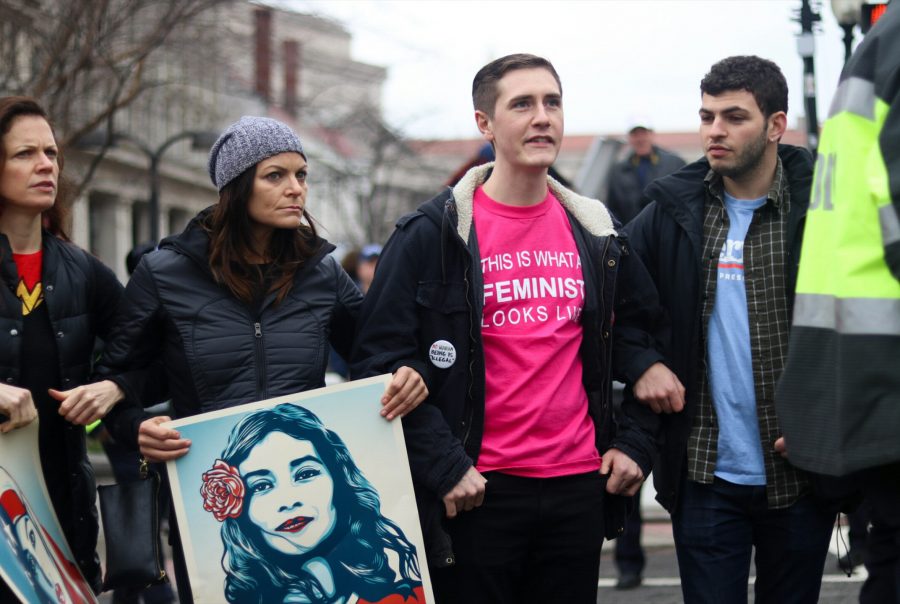A minor’s guide to protesting legally
Women and men supporting the March, holding artist Shepard Fairely’s “We the People” portraits and wearing a feminist shirt.
February 16, 2017
In this day and age, it seems the majority of kids are fighting for what is right, whether it be on social media or expressing their opinions elsewhere.
But finding a way to voice your views as a kid seems hard. Not many people take you seriously over the internet and sometimes fighting with your conservative aunt on Facebook just doesn’t cut it.
So what many people are doing is protesting. Protesting, as an American, is incredibly important. Without protests, our civil rights laws could not be where they are today. It can seem scary, especially with the thought of riots, getting arrested, and police brutality. But it is important to remember that you have rights, and here’s a guide of what to do to exercise those rights safely and effectively.
Protests/ Marches
Protesting in general is something that needs preparation. If you’re thinking of going, there are some things to consider:
Will you have transportation? If it’s a large protest, buses and Metro are most definitely going to be crowded or closed. Especially in DC, roads are frequently closed and parking is a nightmare. Make sure to figure this out beforehand, and please don’t hitchhike.
Who are you going with? You should preferably go with an adult as a safety precaution. A group of friends can work, as long as you maintain communication. Wear something bright, have a specific sign, get one of those ropes that they use for kindergartners, etc. Make sure to have some landmark that everyone knows to meet up at in case something happens.
STAY HYDRATED. This is so important. You’re going to be in a huge crowd, it’s going to be hot, and you’re going to be marching a long distance. BRING WATER. A lot of people will hand out bottles for free, but just in case, bring some change.
And in general, just be careful. If something looks like it’s going to get violent, LEAVE. If the police show up and look like they’re going to do something violent, LEAVE. As a minor, safety is your number one priority.
But in case something does happen, you do have rights, here’s a list of things you can do under the law to stay safe.
Your Rights + What to do if They are Violated
You, as an American, have the right to protest period. You can go anywhere and say anything you want to under the law, to some degree. For huge marches and other large-scale protests, permits are required, but those are mostly taken care of. Though, if something does happen and you get stopped or arrested by the police, here’s what to do:
What if you get stopped by the police?
Cooperate, be polite, and don’t argue. In some states, you are required to give your name if they ask, but you do not have to give paperwork or ID. Keep your hands where the officer can see them, point out you are not disrupting anyone and that you are just exercising your First Amendment rights. Ask if you are free to leave, and if they say yes then you can continue.
What if you’re under arrest?
Do not resist arrest, even if you think it is unjust. You have a right to remain silent. Do not say anything except to ask ask why you’re under arrest. Other than that stay completely silent. You have a right to a lawyer and one local phone call. If you are calling your lawyer, the police are not allowed to listen.
If you are under arrest, the police do have a right to search you, and “pat down” your clothing if they believe you have a weapon. Otherwise, you do not have to consent to any further searches.
If you feel that your rights have been violated, do not resist or threaten to file a complaint. When you can, write down what happened with as many details as you can, including officer’s badge and patrol car numbers and which agency the officers were from.
If you are injured, take photographs of your injuries, but seek medical attention first. Once you have this information, you can file a complaint with the agency’s civilian complaint board; in many cases, you can file a complaint anonymously if you wish.
All in all, protesting is great and vital to our democracy. The more people know what to do, the better. Keep fighting for what you believe in, no matter what it is, and remember your opinion matters.
Stay educated and stay strong.
Hits : 6881



Cynthia Vipond • Feb 16, 2017 at 1:57 pm
Exceptional article, Lee!